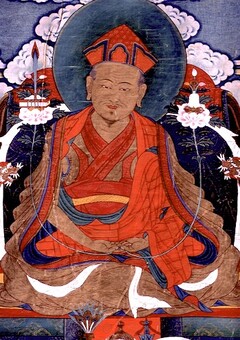Three Masters Swift Rebirth Prayer
༄༅། །འཇིག་རྟེན་གྱི་མགོན་པོ་འདྲེན་མཆོག་དམ་པ་གསུམ་གྱི་མཆོག་སྤྲུལ་མྱུར་འབྱོན་ཡིད་བཞིན་རེ་མོས་ཞེས་བྱ་བ་བཞུགས་སོ། །
The Fulfilment of Hopes and Wishes1
A Prayer for the Swift Rebirth of the Three Supreme Guides, Protectors of this World2
by Jamyang Khyentse Chökyi Lodrö
ཨོཾ་སྭསྟི།
om svasti
Oṃ svasti!
མཁའ་ཁྱབ་ཆོས་སྐུའི་ཞིང་ན་རྟག་བཞུགས་ཀྱང་། །
khakhyab chökü zhing na tak zhuk kyang
Though you dwell forever in the space-pervading field of dharmakāya,
ཡེ་ཤེས་ལྔ་ལྡན་སྒྱུ་མའི་རང་གཟུགས་མཆོག །
yeshe ngaden gyumé rang zuk chok
As supreme illusory manifestations endowed with fivefold wisdom,
དཔལ་ལྡན་བླ་མ་རྡོ་རྗེ་སེམས་དཔའ་རྣམས། །
palden lama dorjé sempa nam
Glorious Vajrasattva gurus—courageous embodiments of the vajra nature,
བདག་སོགས་འགྲོ་ལ་བརྩེ་བས་རྗེས་དགོངས་ནས། །
dak sok dro la tsewé jé gong né
May you turn your loving attention towards me and all other beings.
ཨོ༵་རྒྱན༵་མཁན་པོའི་རིང་ལུགས་སྔ་འགྱུར་གྱི། །
orgyen khenpö ringluk ngagyur gyi
Together with the sun of the fearless exposition and practice
བཀའ་གཏེར་ཆོས༵་ཀྱི༵་རྒྱ༵་མཚོ༵་རབ་འབྱམས་རྣམས། །
kater chökyi gyatso rabjam nam
Of the infinite ocean of Dharma teachings, Kama and Terma,
འཇིག༵ས་མེད༵་བཤད་སྒྲུབ་བསྟ༵ན་པའི༵་ཉི༵་མ༵་དང་། །
jikme shedrub tenpé nyima dang
In the Ancient Translations school of the master of Oḍḍiyāna,
ལྷན་དུ་འགྲོགས་པའི་རྫོགས་ལྡན་སྣང་བ་འཆར། །
lhen du drokpé dzokden nangwa char
Let the light of a new golden era of perfection dawn!3
འགྱུར༵་མེད༵་བདེན་དོན་མངོན་མཛད་རྡོ་རྗེའི་སྐུ། །
gyurmé dendön ngön dzé dorjé ku
Vajra embodiments of the realization of changeless reality,
པདྨ༵་རྒྱས་པ་ལྟ་བུ་ཆགས་ཐོག་བྲལ། །
pema gyepa tabu chak tokdral
Appearing without hindrance just like blossoming lotuses,
མི་བརྗེད་གཟུངས་ཐོབ་བསྟན་པའི་འཁོར་ལོའི་ཚུལ། །
mi jé zung tob tenpé khorlö tsul
May you gain infallible mnemonic powers and remain
ཕྱོགས་ལས་རྣམ༵་རྒྱལ༵་ཆེན་པོར་བཞུགས་སུ་གསོལ། །
chok lé namgyal chenpor zhuk su sol
Like the Wheel of Doctrine,4 greatly victorious over all.5
དེ་ལྟར་གསོལ་བཏབ་ཐུགས་རྗེའི་བདེན་སྟོབས་ཀྱིས། །
detar soltab tukjé den tob kyi
Through this prayer and the powerful force of compassion,
སྤྲུལ་པའི་རྣམ་རོལ་མྱུར་དུ་འབྱོན་པ་དང་། །
trulpé namrol nyurdu jönpa dang
May the displays of these emanations swiftly return to us,
བསྟན་འགྲོའི་ལེགས་བྱས་དབྱར་གྱི་དུས་བཞིན་འཕེལ། །
ten drö lek jé yar gyi dü zhin pel
Positive deeds for the teachings and beings burgeon as if in summertime,
དོན་གཉིས་འབད་མེད་འགྲུབ་པའི་བཀྲ་ཤིས་ཤོག །
dön nyi bemé drubpé tashi shok
And all be auspicious for the effortless accomplishment of twofold benefit!
ཅེས་པའང་འཇམ་དབྱངས་བློ་གྲོས་རྒྱ་མཚོའི་སྙིང་ནས་གུས་པས་སྨོན་ཚིག་ཏུ་ཆོ་འཕྲུལ་ཟླ་བའི་དམར་ཕྱོགས་ཀྱི་བཟང་པོ་གསུམ་པའི་ཚེས་ལ་བྲིས་པ་རེ་བའི་འབྲས་བུ་ཡིད་བཞིན་དུ་སྩོལ་བའི་རྒྱུར་གྱུར་ཅིག །མངྒ་ལཾ། ཤུ་བྷཾ།། །།
Thus, Jamyang Lodrö Gyatso wrote this out of heartfelt devotion on the third 'excellence' of the waning phase of the Month of Miracles.6 May it be a cause for hopes to be fulfilled in accordance with our wishes. Maṅgalam. Śubham.
| Translated by Adam Pearcey with the generous support of the Khyentse Foundation and Tertön Sogyal Trust, 2023.
Source:
'Jam dbyangs chos kyi blo gros. "'jig rten gyi mgon po 'dren mchog dam pa sum gyi mchog sprul myur byon gsol 'debs/" in 'Jam dbyangs chos kyi blo gros kyi gsung 'bum. 12 vols. Bir: Khyentse Labrang, 2012. (BDRC W1KG12986). Vol. 3: 595
Version: 1.0-20230619
- ↑ Reading re mos as re skong.
- ↑ The three guides referred to here were three of Jamyang Khyentse’s main teachers, Katok Situ Orgyen Chökyi Gyatso (1880–1925), Dodrupchen Jigme Tenpai Nyima (1865–1926) and Shechen Gyaltsab Gyurme Pema Namgyal (1871–1926), whose names are incorporated into the prayer itself.
- ↑ This verse incorporates the syllables of the names of the Katok Situ Orgyen Chökyi Gyatso and Dodrupchen Jigme Tenpai Nyima.
- ↑ bstan pa’i 'khor lo, possibly to be read as brtan pa’i 'khor lo, i.e., Sthiracakra, an epithet of Mañjuśrī.
- ↑ This verse incorporates the syllables of the name of Shechen Gyaltsab Gyurme Pema Namgyal.
- ↑ i.e., the twenty-seventh day of the first month of the Tibetan year. This was almost certainly 30 March 1927.
